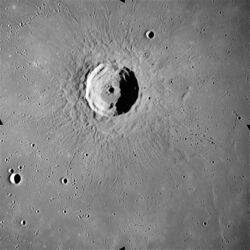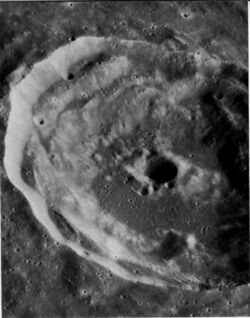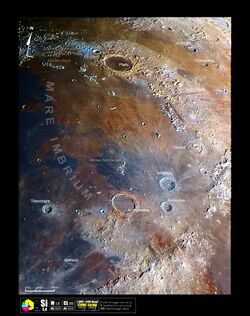Astronomy:Timocharis (crater)
 | |
| Diameter | 34 km |
|---|---|
| Depth | 3.1 km |
| Colongitude | 13° at sunrise |

Timocharis is a prominent lunar impact crater located on the Mare Imbrium. It was named after ancient Greek astronomer Timocharis.[1] The closest crater of comparable dimensions is Lambert to the west. The smaller craters Feuillée and Beer lie to the east of Timocharis.
The rim of Timocharis has a somewhat polygonal outline, with an outer rampart that extends over 20 kilometers in all directions. The interior wall is slumped and sharply terraced. The center of the floor is occupied by a craterlet that lies on a slight rise. This impact has almost completely removed the original central peak. The crater may have a minor ray system that extends for over 130 km (81 mi).
The crater is likely to have been formed in the Eratosthenian, between 3.2 and 1.1 Billion years ago, as it lacks a prominent ray system, but has not been significantly eroded by impacts.[2][3]
Timocharis is a potential target for lunar exploration due to its young age, which may give information on the formation of central peak craters elsewhere on the lunar surface.[2]
To the north of Timocharis is a tiny crater chain named the Catena Timocharis. THere are also a number of smaller craters in the immediate vicinity - notably Heinrich , Landsteiner, and Pupin.
Satellite craters
By convention these features are identified on lunar maps by placing the letter on the side of the crater midpoint that is closest to Timocharis.
| Timocharis | Latitude | Longitude | Diameter |
|---|---|---|---|
| B | 27.9° N | 12.1° W | 33.5 km |
| C | 24.8° N | 14.2° W | 33.2 km |
| D | 23.8° N | 15.1° W | 32.7 km |
| E | 24.6° N | 17.1° W | 32.6 km |
| H | 23.6° N | 16.6° W | 32.1 km |
The following craters have been renamed by the IAU.
- Timocharis A — See Heinrich (crater).
- Timocharis F — See Landsteiner (crater).
- Timocharis K — See Pupin (crater).
References
- ↑ "Timocharis (crater)". Gazetteer of Planetary Nomenclature. USGS Astrogeology Research Program.
- ↑ 2.0 2.1 Lawrence, Samuel (9 September 2009). "Timocharis Crater". https://www.lroc.asu.edu/posts/100.
- ↑ The geologic history of the Moon. USGS Professional Paper 1348. By Don E. Wilhelms, John F. McCauley, and Newell J. Trask. U.S. Government Printing Office, Washington: 1987. Table 12.2.
- Andersson, L. E.; Whitaker, E. A. (1982). NASA Catalogue of Lunar Nomenclature. NASA RP-1097.
- Bussey, B.; Spudis, P. (2004). The Clementine Atlas of the Moon. New York: Cambridge University Press. ISBN 978-0-521-81528-4.
- Cocks, Elijah E.; Cocks, Josiah C. (1995). Who's Who on the Moon: A Biographical Dictionary of Lunar Nomenclature. Tudor Publishers. ISBN 978-0-936389-27-1. https://archive.org/details/isbn_9780936389271.
- McDowell, Jonathan (July 15, 2007). "Lunar Nomenclature". Jonathan's Space Report. http://host.planet4589.org/astro/lunar/.
- Menzel, D. H.; Minnaert, M.; Levin, B.; Dollfus, A.; Bell, B. (1971). "Report on Lunar Nomenclature by the Working Group of Commission 17 of the IAU". Space Science Reviews 12 (2): 136–186. doi:10.1007/BF00171763. Bibcode: 1971SSRv...12..136M.
- Moore, Patrick (2001). On the Moon. Sterling Publishing Co. ISBN 978-0-304-35469-6. https://archive.org/details/patrickmooreonmo00patr.
- Price, Fred W. (1988). The Moon Observer's Handbook. Cambridge University Press. ISBN 978-0-521-33500-3.
- Rükl, Antonín (1990). Atlas of the Moon. Kalmbach Books. ISBN 978-0-913135-17-4.
- Webb, Rev. T. W. (1962). Celestial Objects for Common Telescopes (6th revised ed.). Dover. ISBN 978-0-486-20917-3. https://archive.org/details/celestialobjects00webb.
- Whitaker, Ewen A. (1999). Mapping and Naming the Moon. Cambridge University Press. ISBN 978-0-521-62248-6.
- Wlasuk, Peter T. (2000). Observing the Moon. Springer. ISBN 978-1-85233-193-1.
External links
- Wood, Chuck (February 5, 2007). "Ringed with Almost Nothing Visible". Lunar Photo of the Day. http://www.lpod.org/?m=20070205.
- LTO-40B3 Kovalevskij — L&PI topographic map of crater and vicinity.
 |



